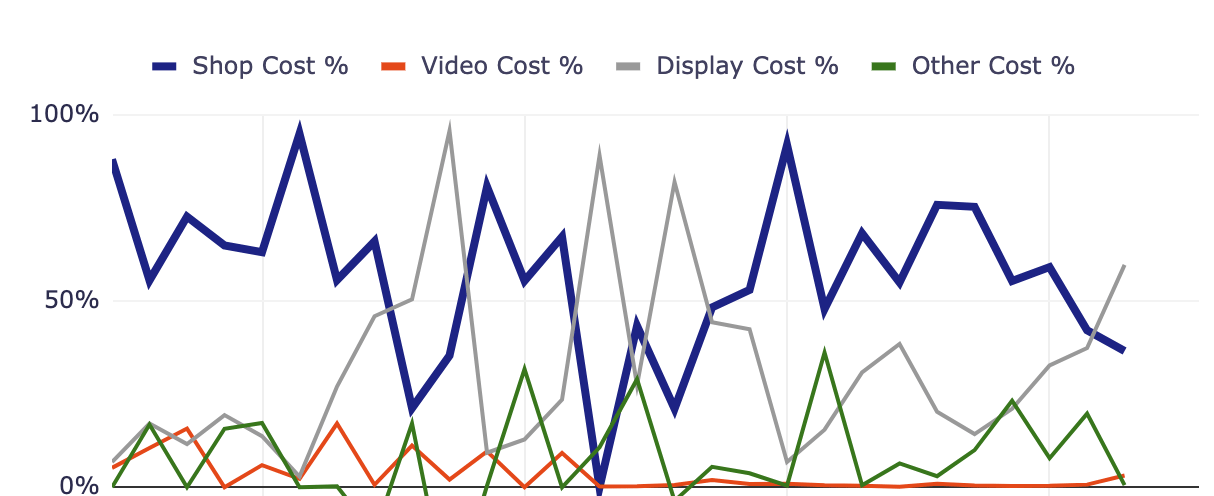- Brick by Brick
- Posts
- Google & Meta Ad Changes: What's Working (and Not Working) in 2025
Google & Meta Ad Changes: What's Working (and Not Working) in 2025
Get ahead of the platforms with these strategies

Hey friend!
The landscape of Meta and Google Ads has shifted significantly over the past year, and the old strategies just won’t cut it anymore. Here's what’s changed and how you can stay ahead of these trends:
Meta (Facebook & Instagram): Broad is the New Targeted
Meta Ads have taken a dramatic turn toward broader targeting. Gone are the days when hyper-specific audiences alone would drive results. Today, your creative and ad copy do most of the targeting work.
So, how does one unlock scale?
You need to be putting out more creative (volume) as well as more variety (drastically different looking pieces of creative and ad formats). This gives Facebook & Instagram more opportunity to find various ad placements, and demographics to help scale.
If you continue to dump in just statics or just videos, you may see Meta push one of those with 80-90% of overall spend. When you add other types of ads to an ad account, it can have more leverage to find other placements that work.
For example, if I upload short videos, Meta may push those primarily in the stories placement. But If I add images and longer videos to the ad account, they can find winners in feeds with images and in Reels with the longer videos. This is why creative variety is such an integral part of Meta ads now.

Here are a few more examples of creative variety to think about getting and running:
Image ads
UGC
Polish high-quality images
Lifestyle shots
Product in use
Video ads
UGC
Unboxings
Product Demo
Founder ads
Studio shoots
Various lengths of videos (15 secs, 30 secs, 45 secs, 60 secs, 90 secs)
Carousel ads
Whitelisted ads (ads running through another page/profile)
Want more?
Key Takeaways:
Invest heavily in creative diversity. You need more variations of your ads to find what's resonating and to get winners in more placements.
Let your creative do the heavy lifting. The algorithm now depends on compelling visuals and copy to attract the right audience.
Test, test, and test again. Regularly refresh your creatives to combat ad fatigue and maintain performance.
Google Ads: Navigate Carefully Around PMax
Google Ads has leaned harder into Performance Max (PMax), which heavily integrates remarketing across campaign types. While this can be beneficial, it's essential to recognize Google's goal here: capturing easy remarketing sales through broader campaigns that can sometimes blur transparency.
What we sometimes see with PMax is that we spend more, but we aren’t seeing a big lift in sales. This is because it’s shifting spending to placements to get the results you are asking for.
For example, say you want a 3X ROAS so you set PMax to a TargetROAS of 3X. You give the campaign some time to run and notice it’s hitting under the mark at 2.5X. Traditionally, with other campaigns, you might just increase the Target to 3.5X to make Google a bit pickier with how it spends.
With PMax, we see that when we do a shift like that, all of a sudden the placement shifts to Display more (meaning in theory that Google is trying to get you that higher ROAS by shifting to remarketing Display ads).
You can see below in our Dashboard that Display (the grey line) ramps up quite aggressively at times, when we’ve tested shifting TargetROAS.

So what you should do now is look at PMax more as a cleanup/remarketing type of campaign. Run it still, but try to push Shopping, Generic Search and YouTube campaigns more to lift sales and scale.
Key Takeaways:
Prioritize traditional Search and Shopping campaigns as your main traffic drivers. Keep control and visibility as much as possible.
Use PMax strategically, treating it as a remarketing-heavy "clean-up" campaign rather than your main driver of net new sales.
Maintain tighter control of your budget by setting clear boundaries on PMax spend.
What's Next?
Stay adaptable, double down on a wider variety of creative, and use Google’s tools carefully. This balanced approach will put you ahead of competitors who rely too heavily on outdated strategies.
How We Can Help You
1. Get A Creative & Ad Account Audit 2. Follow us. That’s all for now, folks! |